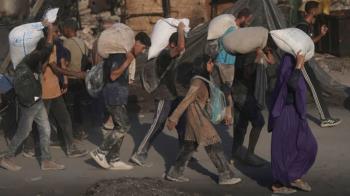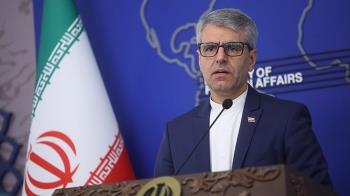Alwaght-Saudi Arabia is sinking into a major quagmire in its brutal aggression on Yemen with reports of an intensifying power struggle within the monarchy and strained ties with its Persian Gulf allies.
According to a Friday report by Washington Post, the Al Saud regime in Riyadh is facing unprecedented economic and political challenges facing due to its war on its impoverished neighbor. The report titled 'Yemen is turning into Saudi Arabia’s Vietnam' notes that the Saudi-led coalition appears increasingly hobbled by divisions and unable to find a face-saving way to end the costly conflict.
“This war is draining the Saudis militarily, politically, strategically,” said Farea al-Muslimi, a Yemen analyst at the Beirut-based Carnegie Middle East Center. “The problem is, they’re stuck there.”
As the conflict drags on, mounting civilian casualties and a worsening humanitarian crisis have drawn criticism from international rights groups. More than 7,200 people have been killed since the illegal aggression began, and U.N. officials warn of famine in the desperately poor country of 25 million people.
According to the report, the Saudi war on Yemen, has is also led murmurs among the regime's allies and arms suppliers including the US and the UK, to keep up their support for the Saudi regime in the military campaign.
Inside the kingdom, analysts say, the war has intensified apparent power struggles within the secretive and opaque royal family.
King Salman, who took power in January, has rattled the kingdom with shake-ups, including the appointment of his 30-year-old son to deputy crown prince and defense minister, placing him in charge of the Yemen campaign. An economy battered by low oil prices has added to the friction. Dissenters within the royal family have released several open letters criticizing the king.
“It’s all somewhat murky, of course, but the war is generating this competition for power,” said Yezid Sayigh, a Middle East analyst at the Carnegie Middle East Center.
The relatively small number of Saudi troops fighting in Yemen — estimated at several hundred — signals Saudi rulers’ heightened concern about the potential domestic blowback over casualties from the war, Sayigh said.
Despite requests from Saudi Arabia, allies such as Egypt and Pakistan have refused to send in ground forces. Several thousand UAE troops have taken the lead on the ground in Yemen.
Yemen has been under Saudi airstrikes on a daily basis since March 26. The regime in Riyadh unleashed the air raids in a bid to undermine the Houthi Ansarullah movement and restore power to fugitive former Yemeni President Abd Rabbuh Mansour Hadi, a staunch ally of Saudi Arabia.
According to a Yemeni coalition of observers monitoring the Saudi aggression, over 7,200 people, including about 1,990 children and women, have been killed in the Saudi airstrikes, and a over 15,000 injured since March.
The Saudi-led coalition claims that it is bombing the positions of the Ansarullah movement fighters, but the coalition warplanes are flattening residential areas and civilian infrastructure including schools, hospitals, mosques etc.
- Tehran: Lebanon Needs Military Power for Self-Defense
- What Are Geopolitical Impacts of US-brokered Azerbaijan-Armenia Corridor Deal?
- Gen. Javani Cautions About the Repercussions of A US Corridor in The Caucasus
- Aid Sites in Gaza Become Scenes of Deadly Random Gunfire Targeting Civilians
- Israeli Drone Attack Kills One in Southern Lebanon in Fresh Ceasefire Breach
- Israeli Forces Push Forward in Quneitra in New Breach of Syria’s Sovereignty
- Araghchi: Strengthened Iran-Saudi Cooperation Key to Regional Stability
- Consequences of a Dangerous Decision: Will Hezbollah Be Disarmed?
- The “Zangezur Corridor”: A US-Israeli Strategy 34 Years in the Making
- Germany Suspends Military Exports to Israel Amid Brutal Gaza Offensive
Editor's Choice

Just for Show: Why Are Aid Airdrops not a Solution to Gaza Catastrophe? Some foreign countries drop aids to Gaza in a largely show campaign, ignoring Israeli blockade as the cause of starvation and famine.
What Are the Consequences of American and Israeli Interceptor Missiles Drain? The 12-day war exposed the American and Israeli vulnerability to protracted missile strikes.
What Are Regional and International Effects of Macron’s Decision to Recognize Palestinian State? The French government finally joined the world front to support Palestine, something proving that resistance is the best option for Palestinians.
Why’s Syria not Settling Down? Syria has sunken into a state of chaos as the central government is weak and Israeli intervention is sending things complicated.
Resistance or Destruction: Syria Developments Have Serious Lessons to Iraq and Lebanon Syria is sinking in chaos as it forsook its historical resistance identity and this sends warnings to Iraq and Lebanon.
News

Tehran: Lebanon Needs Military Power for Self-Defense
Despite Western calls for Hezbollah to disarm, maintaining military strength is vital to safeguarding Lebanon’s inherent right to self-defenseGen. Javani Cautions About the Repercussions of A US Corridor in The Caucasus The IRGC’s political deputy cautioned against the potential consequences of the Trump Corridor
Aid Sites in Gaza Become Scenes of Deadly Random Gunfire Targeting Civilians The Guardian’s investigation connects Israeli fire to over 1,300 Palestinian fatalities and more than 2,000 injuries near Gaza food distribution centers
Israeli Drone Attack Kills One in Southern Lebanon in Fresh Ceasefire Breach At least one person was killed in an Israeli military strike on southern Lebanon, in yet another violation of the 2024 ceasefire agreement
Israeli Forces Push Forward in Quneitra in New Breach of Syria’s Sovereignty Israeli forces entered multiple towns and villages in Syria’s strategically important southwestern province of Quneitra
Araghchi: Strengthened Iran-Saudi Cooperation Key to Regional Stability Iranian Foreign Minister Abbas Araghchi praised the expanding cooperation with Saudi Arabia
The “Zangezur Corridor”: A US-Israeli Strategy 34 Years in the Making A senior expert on the Caucasus explains that the “Zangezur Corridor” is a 34-year-old US plan that Iran and Russia have opposed from the outset
Germany Suspends Military Exports to Israel Amid Brutal Gaza Offensive Germany has halted all military exports to Israel that might be employed in its harsh Gaza conflict
Senior Hezbollah Lawmaker: Giving Up Arms Is Suicide A Lebanese parliamentarian from Hezbollah’s political bloc has firmly rejected calls for the resistance movement to disarm
Israel Ignites Global Backlash Over US-supported Plan to Occupy Gaza City Israel’s plan to capture Gaza City and forcibly relocate nearly a million Palestinians to designated zones in the south has drawn widespread global condemnation
Iran Backs Armenia–Azerbaijan Peace, Opposes Foreign Interference Iran has praised the recent Armenia–Azerbaijan peace deal as a significant step toward regional stability
Larijani Designated as Iran’s Senior Security Official Ali Larijani was appointed by the Iranian president as the new secretary of the Supreme National Security Council
Putin and US Envoy Witkoff Conclude Three-Hour Meeting at the Kremlin The Kremlin meeting between Russian President Vladimir Putin and US special envoy Steve Witkoff has come to an end
IRGC: Circumstances Have Shifted to Iran’s Advantage Recent regional and global developments have turned to Iran’s advantage after its effective counterstrikes against the Zionist regime in the latest imposed conflict
UN Experts Call for Immediate Termination of Israel’s US-Backed GHF Aid Program Israel’s US-funded Gaza Humanitarian Foundation (GHF) must be immediately dismantled, according to 35 UN special rapporteurs
Iran Executes Spy Accused of Mossad Ties in Nuclear Scientist Assassination Case Iran has confirmed the execution of a convicted Mossad spy accused of leaking intelligence on a nuclear scientist who was subsequently killed
MKO-Linked Sabotage Team Disbanded by Iranian Intelligence in SE Tehran In southeastern Tehran, Iran’s intelligence forces successfully neutralized a sabotage group connected to the MKO terrorist organization
Legacy of Constitutional Revolution Reflects Iran’s Rejection of Tyranny, Parliament Speaker Says According to Parliament Speaker Mohammad Baqer Qalibaf, the Constitutional Revolution in Iran reflected the popular will to establish a religious democracy
Iranian Vice President Expresses Support for Regional Stability Tehran supports regional peace and the peaceful resolution of conflicts, Iranian Vice President Mohammad Reza Aref said
UN Envoy Rejects PGCC Accusations Against Iran The Iranian envoy to the UN rejected what he described as “unfounded” assertions about Iran in a recent PGCC statement
Most Viewed
Gen. Javani Cautions About the Repercussions of A US Corridor in The Caucasus
Israeli Forces Push Forward in Quneitra in New Breach of Syria’s Sovereignty
Israeli Drone Attack Kills One in Southern Lebanon in Fresh Ceasefire Breach
Araghchi: Strengthened Iran-Saudi Cooperation Key to Regional Stability
Aid Sites in Gaza Become Scenes of Deadly Random Gunfire Targeting Civilians
What Are Geopolitical Impacts of US-brokered Azerbaijan-Armenia Corridor Deal?
Iran Report Reveals NATO’s Intelligence Role in 12-day War
Iran Plans to Pursue Compensation in Talks with US, Official States
Lessons Learned from Israeli-Iranian War
Hamas Accuses Netanyahu of Endangering Israeli Hostages by Starving Gaza
Iran Regards Any Plan That Ensures the Right to Enrichment as Acceptable
UN Envoy Rejects PGCC Accusations Against Iran
How Likely is a Second Israeli War on Iran Amid Tel Aviv’s Impasse?
IRGC: Circumstances Have Shifted to Iran’s Advantage
Imam Reza Shrine Sends 1,000 Volunteers to Support Arbaeen Pilgrimage in Iraq
Putin and US Envoy Witkoff Conclude Three-Hour Meeting at the Kremlin
Anti-Semitism Redefinition: An Instrument to Crack Down on Zionism Critics
Just for Show: Why Are Aid Airdrops not a Solution to Gaza Catastrophe?
Israel Ignites Global Backlash Over US-supported Plan to Occupy Gaza City
Senior Hezbollah Lawmaker: Giving Up Arms Is Suicide
The “Zangezur Corridor”: A US-Israeli Strategy 34 Years in the Making
What Are Regional and International Effects of Macron’s Decision to Recognize Palestinian State?
Israeli Soldiers Returning from Gaza War Increasingly Commit Suicide
Resistance or Destruction: Syria Developments Have Serious Lessons to Iraq and Lebanon
Pakistan and Iran Boosting Strategic Ties Under Arbaeen Cooperation
As Syria Sinks in Crisis again, Re-embracing Spirit of Resistance Looks Only Working Choice
Al-Sharaa’s Azerbaijan Visit Suggests Anti-Iranian Bloc in the Making
Iran to Maintain Uranium Enrichment, Says Foreign Minister
Iran, Russia to Launch Joint Naval Drill in Caspian Sea
Iranian IRGC Frigate Joins Joint Naval Drill with Russia in Caspian Sea
Why’s Syria not Settling Down?
Araghchi Dismisses Israel’s Demand to Limit Range of Iranian Missiles
From Ethiopia to Indonesia as Destinations: Has the Grand Migration of Gazans Started?
Party Tensions Rise as North Carolina Democrats Label Israel an ‘Apartheid’ State
Two Additional Agents with Alleged Ties to Mossad Arrested in Northeastern Iran
Zangezur Corridor Has Several Aspects, Pursued by More than One Actor: Expert
In Focus

Ansarullah
A Zaidi Shiite movement operating in Yemen. It seeks to establish a democratic government in Yemen.
Shiite
represents the second largest denomination of Islam. Shiites believe Ali (peace be upon him) to be prophet"s successor in the Caliphate.
Resistance
Axis of Resistances refers to countries and movements with common political goal, i.e., resisting against Zionist regime, America and other western powers. Iran, Syria, Hezbollah in Lebanon, and Hamas in Palestine are considered as the Axis of Resistance.
Persian Gulf Cooperation Council
A regional political u n i o n consisting of Arab states of the Persian Gulf, except for Iraq.
Taliban
Taliban is a Sunni fundamentalist movement in Afghanistan. It was founded by Mohammed Omar in 1994.
Wahhabism & Extremism
Wahhabism is an extremist pseudo-Sunni movement, which labels non-Wahhabi Muslims as apostates thus paving the way for their bloodshed.
Kurds
Kurds are an ethnic group in the Middle East, mostly inhabiting a region, which spans adjacent parts of Iran, Iraq, Syria, and Turkey. They are an Iranian people and speak the Kurdish languages, which form a subgroup of the Northwestern Iranian branch of Iranian languages.
NATO
The North Atlantic Treaty Organization is an intergovernmental military alliance based on the North Atlantic Treaty which was signed on 4 April 1949.
Islamic Awakening
Refers to a revival of the Islam throughout the world, that began in 1979 by Iranian Revolution that established an Islamic republic.
Al-Qaeda
A militant Sunni organization founded by Osama bin Laden at some point between 1988 and 1989
New node













